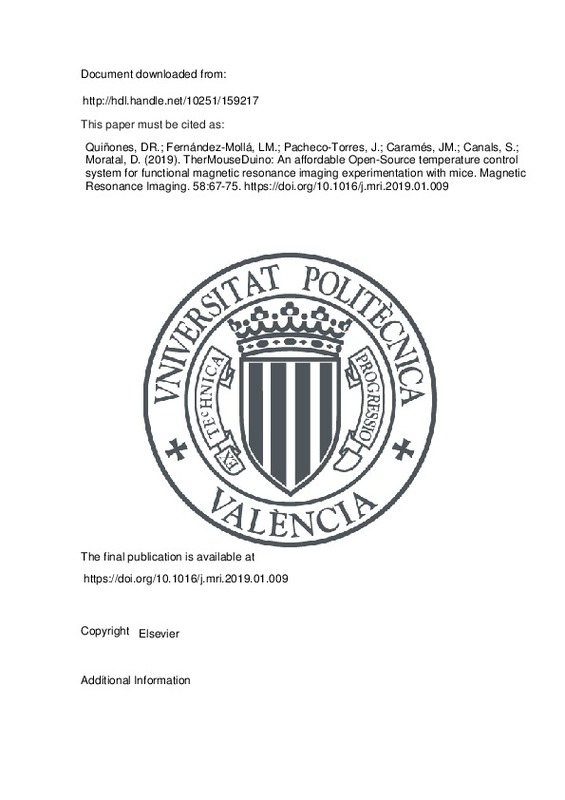JavaScript is disabled for your browser. Some features of this site may not work without it.
Buscar en RiuNet
Listar
Mi cuenta
Estadísticas
Ayuda RiuNet
Admin. UPV
TherMouseDuino: An affordable Open-Source temperature control system for functional magnetic resonance imaging experimentation with mice
Mostrar el registro sencillo del ítem
Ficheros en el ítem
| dc.contributor.author | Quiñones, Darío R.
|
es_ES |
| dc.contributor.author | Fernández-Mollá, Luis Miguel
|
es_ES |
| dc.contributor.author | Pacheco-Torres, Jesús
|
es_ES |
| dc.contributor.author | Caramés, José M.
|
es_ES |
| dc.contributor.author | Canals, Santiago
|
es_ES |
| dc.contributor.author | Moratal, David
|
es_ES |
| dc.date.accessioned | 2021-01-16T04:32:26Z | |
| dc.date.available | 2021-01-16T04:32:26Z | |
| dc.date.issued | 2019-05 | es_ES |
| dc.identifier.issn | 0730-725X | es_ES |
| dc.identifier.uri | http://hdl.handle.net/10251/159217 | |
| dc.description.abstract | [EN] Introduction: Functional magnetic resonance imaging (fMRI) is one of the most highly regarded techniques in the neuroimaging field. This technique is based on vascular responses to neuronal activation and is extensively used in clinical and animal research studies. In preclinical settings, fMRI is usually applied to anesthetized animals. However, anesthetics cause alterations, e.g. hypothermia, in the physiology of the animals and this has the potential to disrupt fMRI signals. The current temperature control method involves a technician, as well as monitoring the acquisition MRI sequences, also controlling the temperature of the animal; this is inefficient. Methods: In order to avoid hypothermia in anesthetized rodents an Open-Source automatic temperature control device is presented. It takes signals from an intrarectal temperature sensor, as well as signals from a thermal bath, which warms up the body of the animal under study, in order to determine the mathematical model of the thermal response of the animal. Results: A Proportional-Integral-Derivative (PID) algorithm, which was discretized in an Arduino micro-controller, was developed to automatically keep stable the body temperature of the animal under study. The PID algorithm has been shown to be accurate in preserving the body temperature of the animal. Conclusion: This work presents the TherMouseDuino. It is an Open-Source automatic temperature control system and reduces temperature fluctuations, thus providing robust conditions in which to perform fMRI experiments. Furthermore, our device frees up the technician to focus solely on monitoring the MRI sequences. | es_ES |
| dc.description.sponsorship | This work was supported in part by the Spanish Ministerio de Economia y Competitividad (MINECO) and FEDER funds under grants BFU2015-64380-C2-2-R (D.M.) and BFU2015-64380-C2-1-R and EU Horizon 2020 Program 668863-SyBil-AA grant (S.C.). S.C. acknowledges financial support from the Spanish State Research Agency, through the "Severo Ochoa" Programme for Centres of Excellence in R&D (ref. SEV-2013-0317). D.R.Q. was supported by grant "Ayudas para la formation de personal investigador (FPI)" from the Vicerrectorado de Investigation, Innovation y Transferencia of the Universitat Politecnica de Valencia. | es_ES |
| dc.language | Inglés | es_ES |
| dc.publisher | Elsevier | es_ES |
| dc.relation.ispartof | Magnetic Resonance Imaging | es_ES |
| dc.rights | Reconocimiento - No comercial - Sin obra derivada (by-nc-nd) | es_ES |
| dc.subject | Anesthetic | es_ES |
| dc.subject | Arduino | es_ES |
| dc.subject | BOLD | es_ES |
| dc.subject | FMRI | es_ES |
| dc.subject | Mice | es_ES |
| dc.subject | PID | es_ES |
| dc.subject.classification | TECNOLOGIA ELECTRONICA | es_ES |
| dc.title | TherMouseDuino: An affordable Open-Source temperature control system for functional magnetic resonance imaging experimentation with mice | es_ES |
| dc.type | Artículo | es_ES |
| dc.identifier.doi | 10.1016/j.mri.2019.01.009 | es_ES |
| dc.relation.projectID | info:eu-repo/grantAgreement/EC/H2020/668863/EU/Systems Biology of Alcohol Addiction: Modeling and validating disease state networks in human and animal brains for understanding pathophysiolgy, predicting outcomes and improving therapy/ | es_ES |
| dc.relation.projectID | info:eu-repo/grantAgreement/MINECO//BFU2015-64380-C2-1-R/ES/TRATAR LA ENFERMEDAD RESINTONIZANDO LA DINAMICA DE LAS REDES CEREBRALES/ | es_ES |
| dc.relation.projectID | info:eu-repo/grantAgreement/MINECO//SEV-2013-0317/ES/-/ | es_ES |
| dc.relation.projectID | info:eu-repo/grantAgreement/MINECO//BFU2015-64380-C2-2-R/ES/ANALISIS DE TEXTURAS EN IMAGEN CEREBRAL MULTIMODAL POR RESONANCIA MAGNETICA PARA UNA DETECCION TEMPRANA DE ALTERACIONES EN LA RED Y BIOMARCADORES DE ENFERMEDAD/ | es_ES |
| dc.rights.accessRights | Abierto | es_ES |
| dc.contributor.affiliation | Universitat Politècnica de València. Departamento de Ingeniería Electrónica - Departament d'Enginyeria Electrònica | es_ES |
| dc.description.bibliographicCitation | Quiñones, DR.; Fernández-Mollá, LM.; Pacheco-Torres, J.; Caramés, JM.; Canals, S.; Moratal, D. (2019). TherMouseDuino: An affordable Open-Source temperature control system for functional magnetic resonance imaging experimentation with mice. Magnetic Resonance Imaging. 58:67-75. https://doi.org/10.1016/j.mri.2019.01.009 | es_ES |
| dc.description.accrualMethod | S | es_ES |
| dc.relation.publisherversion | https://doi.org/10.1016/j.mri.2019.01.009 | es_ES |
| dc.description.upvformatpinicio | 67 | es_ES |
| dc.description.upvformatpfin | 75 | es_ES |
| dc.type.version | info:eu-repo/semantics/publishedVersion | es_ES |
| dc.description.volume | 58 | es_ES |
| dc.identifier.pmid | 30660705 | es_ES |
| dc.relation.pasarela | S\376596 | es_ES |
| dc.contributor.funder | European Commission | es_ES |
| dc.contributor.funder | European Regional Development Fund | es_ES |
| dc.contributor.funder | Universitat Politècnica de València | es_ES |
| dc.contributor.funder | Ministerio de Economía y Competitividad | es_ES |







![[Cerrado]](/themes/UPV/images/candado.png)

